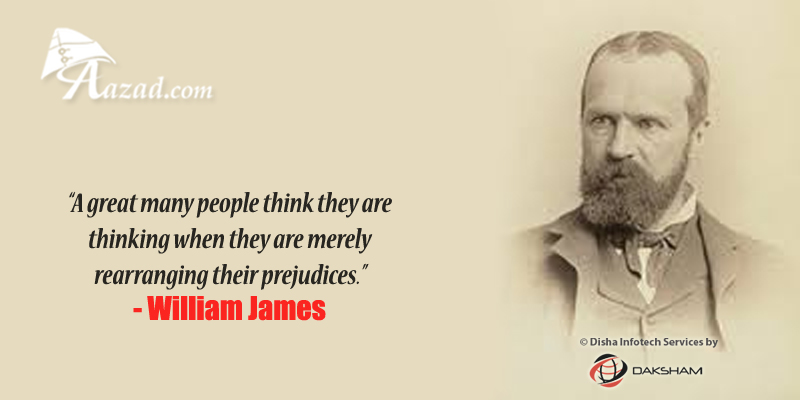- ●Breakthroughs in Prostate Cancer Treatment: What Every Patient Should Know
- ●Ovarian Cancer: The Silent Disease Women Cannot Ignore
- ●Children and Blood Cancer: Why Awareness is Crucial
- ●Women in Aviation India commences the celebration of 10th Girls in Aviation Day
- ●2025 Announcement, Appointment of New Board to Lead Hindustan National Glass & Industries Ltd
William James

There is but one cause of human failure, and that is man’s lack of faith in his true self.
-William James (1842-1910)
It makes a tremendous emotional and practical difference to one whether one accept the universe in the drab discoloured way of stoic resignation to necessity, or with the passionate happiness of Christian saints.
-William James (1842-1910)
Little by little, Tolstoy came to the settled
conviction . . . that his trouble had not been
with life in general, not with the common
life of common men, but with the life of the
upper, intellectual, artistic classes, the life
which he had personally always led, the
cerebral life, the life of conventionality,
artificiality, and personal ambition.
-William James (1842-1910)
The sanest and best of us are of one clay with lunatics and prison inmates, and death finally runs the robustest of us down
-William James (1842-1910)
If things are ever to move upward, some one must be ready to take the first step, and assume the risk of it. No one who is not willing to try charity, to try non-resistance . . . can tell whether these methods will or will not succeed. When they do Succeed, they are far more powerfully successful than force or worldly prudence.
-William James (1842-1910)
To change one’s life: start immediately - do it flamboyantly. No exceptions (no excuses).
-William James (1842-1910)
Much of what we call evil is due entirely to the way men take the phenomenon. It can so often be converted into a bracing and tonic good by a simple change of the sufferer’s inner attitude from one of fear to one of fight . . . Since you make them evil or good by your own thoughts about them, it is the ruling of your thoughts which proves to be your principal concern.
-William James (1842-1910)
There is a state of mind, known to religious men, but to no others, in which the will to assert ourselves and hold our own has been displaced by a willingness to close our mouths and be as nothing in the floods and waterspouts of God. In this state of mind . . . the time for tension in our soul is over, and that of happy relaxation, of calm deep breathing, of an eternal present, with no discordant future to be anxious about, has arrived.
-William James (1842-1910)
Happiness! happiness! Religion is only one of the ways in which men gain that gift. Easily, permanently, and successfully, it often transforms the most intolerable misery into the profoundest and most enduring happiness.
-William James (1842-1910)
Momentarily considered, then, the saint may waste his tenderness and be the dupe and victim of his charitable fever, but the general function of his charity in social evolution is vital and essential. If things are ever to move upward, some one must be ready to take the first step, and assume the risk of it.
-William James (1842-1910)
experience shows that there are times in every one’s life when one can be better counseled by others than by one’s self. Inability to decide is one of the commonest symptoms of fatigued nerves; friends who see our troubles more broadly, often see them more wisely than we do; so it is frequently an act of excellent virtue to consult and obey a doctor, a partner, or a wife.
-William James (1842-1910)
‘Love your enemies!’ Mark you, not simply those who happen not to be your friends, but your enemies, your positive and active enemies. Can there in general be a level of emotion so unifying, so obliterative of differences between man and man . . . they (the effects) might conceivably transform the world.
-William James (1842-1910)
All at once, without warning of any kind, I found myself wrapped in a flame-coloured cloud . . . Directly afterwards there came upon me a sense of exultation, of immense joyousness, accompanied or immediately followed by an intellectual illumination quite impossible to describe. Among other things, I did not merely come to believe, I saw that the universe is not composed of dead matter, but is, on the contrary, a living Presence; I became conscious in myself of eternal life. It was not a conviction that I would have eternal life, but a consciousness that I possessed eternal life then.
-William James (1842-1910)
In mystical literature such self-contradictory phrases as ‘dazzling obscurity’, ‘whispering silence’, ‘teeming desert’, are continually met with. They prove that not conceptual speech, but music rather, is the element through which we are best spoken to by mystical truth.
-William James (1842-1910)
This act is prayer, by which term I understand no vain exercise of words, no merer repetition of certain sacred formulae, but the very movement itself of the soul, putting itself in a personal relation of contact with the mysterious power of which it feels the presence - it may be even before it has a name by which to call it. Wherever this interior prayer is lacking, there is no religion .
-William James (1842-1910)
It is as if there were in the human consciousness a sense of reality, a feeling of objective presence, a perception of what we may call ’somethere there’, more deep and more general than of the special and particular ’senses’ by which the current psychology supposes existent realities to be originally revealed.
-William James (1842-1910)
Our state of mind is never precisely the same. Every thought we have of a given fact is, strictly speaking, unique, and only bears a resemblance of kind with our other thoughts of the same fact . . . Experience is remolding us every moment, and our mental reaction on every given thing is really a resultant of our experience of the whole world up to that date.
-William James (1842-1910)
My first act of free-will shall be to believe in free will . . . I will go a step further with my will, not only act with it, but believe as well; believe in my individual reality and creative power.
-William James (1842-1910)
No one can make clear to another who has never had a certain feeling, in what the quality or worth of it consists. One must have musical ears to know the value of a symphony; one must have been in love one’s self to understand a lover’s state of mind. Lacking the heart or ear, we cannot interpret the musician or the lover justly.
-William James (1842-1910)
Sobriety dimishes, discriminates, and says no; drunkenness expands, unites, and says yes. It is in fact the great exciter of the ‘Yes’ function in man. It brings its votary from the chill periphery of things to the radiant core . . . Not through mere perversity do men run after it. To the poor and the unlettered it stands in the place of symphony concerts and literature . .
-William James (1842-1910)




